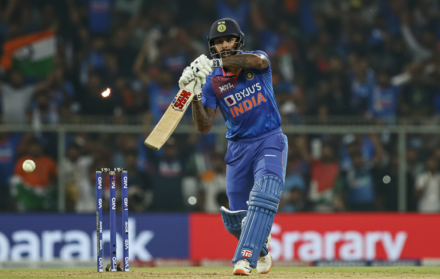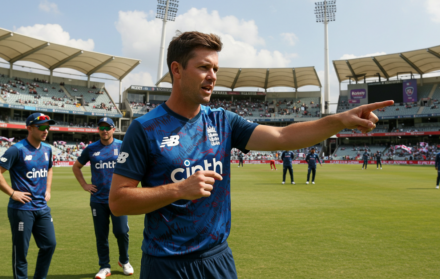
What Is A Century In Cricket
Cricket, a popular sport with a rich history, has its own set of terminology and scoring rules. One such term is a “century,” which holds great significance in the world of cricket. Understanding what a century means is essential for avid cricket fans and enthusiasts.
A century in cricket refers to a milestone achieved by a batsman when they score 100 or more runs in a single innings. It is a remarkable accomplishment and symbolizes the skill and prowess of the player.
The term “century” originated from the Latin word “centum,” meaning one hundred, and has become ingrained in cricket terminology around the globe.
To score a century in cricket, players must adhere to certain rules and criteria. They must accumulate a minimum of 100 runs without getting dismissed by the opposing team. Achieving a century showcases a player’s exceptional batting skills, concentration, and endurance throughout the innings.
Over the years, there have been many famous and memorable centuries scored in international cricket. These centuries have not only contributed to team performance but have also etched the names of players in cricket history.
Records and milestones have been set, creating a benchmark for future players to strive for and showcasing the impact and significance of centuries in the sport.
Scoring a century requires technical skills, shot selection, mental preparation, and unwavering focus. Batsmen must display expertise in various cricketing shots while maintaining composure under pressure. Mental resilience and staying focused throughout the innings play a crucial role in achieving this milestone.
In the following sections, we will delve deeper into the definition and origin of a century in cricket, explore how centuries are scored, highlight famous cricket centuries, discuss the impact and significance of centuries, and provide valuable tips and strategies for aspiring batsmen aiming to score a century in their cricketing careers.
“Century” in Cricket

In the fascinating world of cricket, there is a term that brings excitement and anticipation to fans and players alike – the “century“. What exactly does it mean to score a century in this spectacular sport?
In this section, we’ll unravel the meaning of a century in cricket, diving into its definition and exploring the captivating origin and history behind this term.
So, grab your cricket hats and get ready for a journey into the heart of this milestone achievement!
Definition of a Century in Cricket
In cricket, a century refers to a significant milestone achieved by a batsman when they score 100 or more runs in a single innings. It is a defining achievement in the sport and represents a high level of skill and performance.
The term “century” originated from the value of scoring 100 runs, symbolizing the achievement of reaching triple digits. Scoring a century requires not only technical skills and shot selection but also mental preparation and focus.
Achieving a century holds great significance in both team performance and individual recognition, often contributing to match outcomes and players’ reputations.
This defines a century in cricket, highlighting its importance in the sport.
Origin and History of the Term “Century”
The term “century” in cricket refers to a player scoring 100 runs in a single innings. The origin and history of this term, which describes a player reaching the milestone of 100 runs, can be traced back to the early days of cricket in England. It is believed that the term “century” was first used in the 19th century.
Over time, scoring a century has become a significant achievement in the sport, celebrated as a major accomplishment for a batsman.
The origin and history of the term “century” highlight its importance and the recognition it brings to individual players. Scoring a century not only contributes to a team’s performance but also earns individual appreciation.
How is a Century Scored in Cricket?
Scoring a century in cricket is no small feat, and understanding how it is accomplished is key to appreciating the intricacies of the game. In this section, we will explore the rules and criteria behind scoring a century.
From the number of runs required to the milestones along the way, we will unravel the fascinating journey that batsmen undertake to achieve this significant achievement.
So, grab your cricket gear and join us as we delve into the thrilling world of century scoring in cricket.
Scoring a Century: Rules and Criteria
Scoring a century in cricket requires a batsman to accumulate 100 runs without getting dismissed. The rules and criteria for scoring a century are straightforward:
- The batsman must score 100 runs or more in a single innings.
- The runs can be achieved through boundaries (four runs for hitting the ball to the boundary rope) or running between the wickets with the help of their batting partner.
- Once a batsman reaches the milestone of 100 runs, it is considered a century.
- The achievement of a century is celebrated in cricket as it signifies a batsman’s exceptional performance and skill.
Some notable examples of century records include Sachin Tendulkar‘s 100 international centuries and Brian Lara‘s record-breaking score of 400 not out in a Test match against England.
To score a century, batsmen need to have strong technical skills, excellent shot selection, mental preparation, and focus.
Famous Cricket Centuries

Get ready to relive some amazing moments in cricket history as we dive into the world of famous cricket centuries. From awe-inspiring performances to record-breaking achievements, we’ll be exploring the memorable centuries in international cricket.
And that’s not all – we’ll also uncover the fascinating records and milestones surrounding century scoring.
So, buckle up and prepare to be amazed by the incredible feats achieved by cricketing legends throughout the years.
Memorable Centuries in International Cricket
Some of the most memorable centuries in international cricket are iconic moments that have left a lasting impact on the game. These memorable centuries in international cricket have not only contributed to their teams’ success but have also etched their names in cricket history. Here are a few notable examples:
- Sachin Tendulkar‘s 100th international century in 2012, becoming the first player to achieve this feat.
- Matthew Hayden‘s 380 against Zimbabwe in 2003, setting a new record for the highest individual score in Test cricket at the time.
- Brian Lara‘s 400 not out against England in 2004, breaking Hayden’s record and becoming the first player to score a quadruple century in Test cricket.
- Virat Kohli‘s 254 against South Africa in 2019, showcasing his remarkable batting prowess.
Records and Milestones in Century Scoring
Records and milestones in century scoring are significant in the world of cricket, highlighting exceptional batting performances. Here are some notable achievements:
Fastest century: AB de Villiers achieved a magnificent feat by scoring a century in just 31 balls.
Most centuries in international cricket: Sachin Tendulkar, an iconic cricketer, holds the record with an incredible 100 centuries.
Most consecutive centuries in Test cricket: Kumar Sangakkara demonstrated his exceptional skills by achieving the remarkable feat of scoring 4 centuries in 4 matches consecutively.
Youngest player to score a century in Test cricket: Mohammad Ashraful, a prodigious talent, achieved this momentous milestone at the tender age of 17 years and 61 days.
These records and milestones showcase the extraordinary talent and immense skill of players, leaving an indelible mark on the history of the game.
Impact and Significance of Centuries in Cricket
Centuries in cricket hold immense impact and significance, going beyond just individual accomplishments. They contribute to team performance and earn players well-deserved recognition. With breathtaking statistics and solid performances, centuries shape the dynamics of the game.
Let’s delve into the multifaceted nature of centuries, exploring their role in elevating team morale, boosting individual achievements, and leaving a lasting impact on the sport.
Get ready to witness the power and significance of these monumental milestones in cricket.
Contributions to Team Performance
Contributions to team performance are crucial in cricket and play a significant role in achieving success. Centuries contribute to team performance in several ways:
- Runs on the board: Scoring centuries provides a substantial number of runs, which strengthens the team’s overall score.
- Momentum: Achieving a century boosts the team’s confidence and momentum, creating a positive atmosphere on the field.
- Opposition pressure: Scoring a century puts pressure on the opposing team, forcing them to rethink strategies and giving an advantage to the batting team. This contributes to team performance.
- Time at the crease: Scoring a century ensures a player spends a considerable amount of time at the crease, allowing the team to build substantial partnerships. Such partnerships significantly contribute to team performance.
- Building partnerships: Centuries often involve partnerships with other batsmen, resulting in strong batting collaborations and higher team scores. These collaborations greatly contribute to team performance.
Pro-tip: To contribute to team performance, focus on building solid partnerships and staying at the crease for as long as possible. This will not only boost your individual performance but also enhance the team’s chances of success.
Individual Achievements and Recognition
Individual achievements and recognition play a significant role in the world of cricket. Here are some key aspects to consider:
- Centuries: Scoring a century, which is reaching 100 runs individually, is considered a remarkable achievement in cricket.
- Milestone Records: Players who have scored multiple centuries hold prominent positions in record books and are widely recognized for their consistency and skill.
- Average: A high average, calculated by dividing the total runs by the number of innings, reflects a player’s consistent performance and serves as a measure of their individual success.
- Achievement Awards: Individuals who score centuries often receive recognition, awards, and accolades from the cricket community.
- Legacy: Centuries become part of a player’s legacy, contributing to their overall reputation and status in the game.
Tips and Strategies for Scoring a Century
Scoring a century in cricket is no small feat, but with the right tips and strategies, you can increase your chances of success. In this section, we’ll explore the secrets behind achieving that elusive milestone.
From sharpening your technical skills and shot selection to mastering the art of mental preparation and focus, we’ll uncover the winning formula that can help you reach triple digits on the scoreboard. So grab your bat and get ready to unleash your inner century-maker!
Technical Skills and Shot Selection
1. Technique: Developing the right technical skills, including footwork, body position, and shot execution, is crucial for a batsman to score a century in cricket.
2. Shot Selection: Proper shot selection, based on the line, length, and pace of the delivery, is important for a batsman to score a century in cricket.
3. Patience: Show patience in building an innings, leaving good deliveries, and waiting for scoring opportunities, which is essential for a batsman to score a century in cricket.
4. Focus: Maintain strong concentration throughout the innings, avoiding distractions and staying mentally sharp to score a century in cricket.
5. Adaptability: Adaptability to different pitch conditions, bowlers’ strategies, and match situations is necessary for a batsman to score a century in cricket.
6. Timing and Placement: Develop the ability to time the ball well and place it in the gaps to score runs consistently, which is crucial for a batsman to achieve the milestone of a century in cricket.
These technical skills and shot selection play a vital role in achieving the milestone of a century in cricket.
Mental Preparation and Focus
Mental preparation and focus play a fundamental role in achieving a century in cricket. Here are some valuable tips to assist cricketers in excelling in this crucial aspect of the game:
- Visualize success: Envision yourself successfully scoring a century and embrace the sense of accomplishment that accompanies it.
- Practice mindfulness: Remain fully present in the moment, directing your attention to the current delivery with unwavering focus.
- Develop a routine: Construct a pre-shot routine that aids in relaxation and clearing your mind before each delivery.
- Stay positive: Sustain a confident and optimistic mindset, persevering even in the face of challenging circumstances.
- Control distractions: Minimize external disturbances and uphold a heightened level of concentration throughout the entire innings.
Remember, mental preparation and focus are equally vital as physical skills when it comes to attaining a century in cricket. Continue practicing and refining your mental game to augment your overall performance.
Frequently Asked Questions
What is a “century” in cricket?
A century in cricket refers to a score of 100 or more runs in a single innings by a batter. It is considered a landmark score for batters and is recorded in their career statistics.
What is a century partnership in cricket?
A century partnership occurs when two batsmen add 100 runs to the team total while batting together.
What are double, triple, and quadruple centuries in cricket?
Scores of more than 200 runs are still counted as a century but are referred to as double, triple, or quadruple centuries.
What are the Lord’s honours boards in cricket?
Scoring a century at Lord‘s earns the batter a place on the Lord’s honours boards.
Who holds the record for the most first-class centuries in cricket?
Jack Hobbs currently holds the record for the most first-class centuries with 199.
Who scored the earliest known century in cricket?
The earliest known century was scored by John Minshull in 1769.





